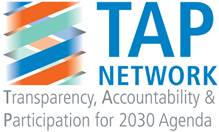Kavita Desai, QUNO NY UN Representative, joined the Transparency, Accountability, and Participation (TAP) Network’s ‘Financing for Development Strategy Workshop-Webinar’ and led a small group discussion. During the small group discussion participants explored priorities for the TAP Network and SDG16+ community during the ongoing UN Financing for Development process.
On 28 January, civil society gathered for this webinar ahead of the third preparatory conference of the 4th International Conference on Financing for Development (FfD). During the event, organizations discussed the role of Sustainable Development Goal 16 (SDG 16) in the FfD process. They also explored how to advance SDG 16 through advocacy at the UN.
Stefano Prato, coordinator of the Civil Society Financing for Development Mechanism, gave an overview of the FfD process. He highlighted where civil society could have the most impact through advocacy. Mr. Prato also discussed the growing divide between Global South and Global North countries regarding their priorities for international financial reform. This divide includes a desire from the Global South for greater representation in and overall reform of international financial institutions and a reluctance from many leaders in the Global North to change current systems. Despite the obstacles posed by this divide, the FfD process also provides an opportunity for civil society to work with Global South countries to push for more inclusive decision-making, which aligns with SDG 16 targets.
In Kavita’s small group discussion, participants discussed how peace and the targets under SDG 16 connect to international financing. The discussion highlighted that the outcome of the 4th International Conference on Financing for Development should not lose the strong social commitments from the Addis Ababa Action Agenda. Colleagues raised concerns about the proposal from countries that are members of the Organization for Economic Co-operation and Development (OECD) for the Total Official Support for Sustainable Development (TOSSD) framework. The TOSSD framework would allow military assistance and other non-traditional spending to be included as development assistance.
In the webinar, civil society organizations emphasized the importance of working in collaboration to strengthen reform and ensure adherence to financial commitments as we look toward post-2030 governance. Including clear language in the outcome document will help secure sustainable and predictable funding for issues like development, climate action, and peacebuilding. Civil society must work together to advocate for these commitments, hold decision-makers accountable, and ensure fair and inclusive financing structures. The webinar is key in building common advocacy priorities, offering a platform for civil society to unite and strengthen their collective efforts for sustainable, equitable solutions.







